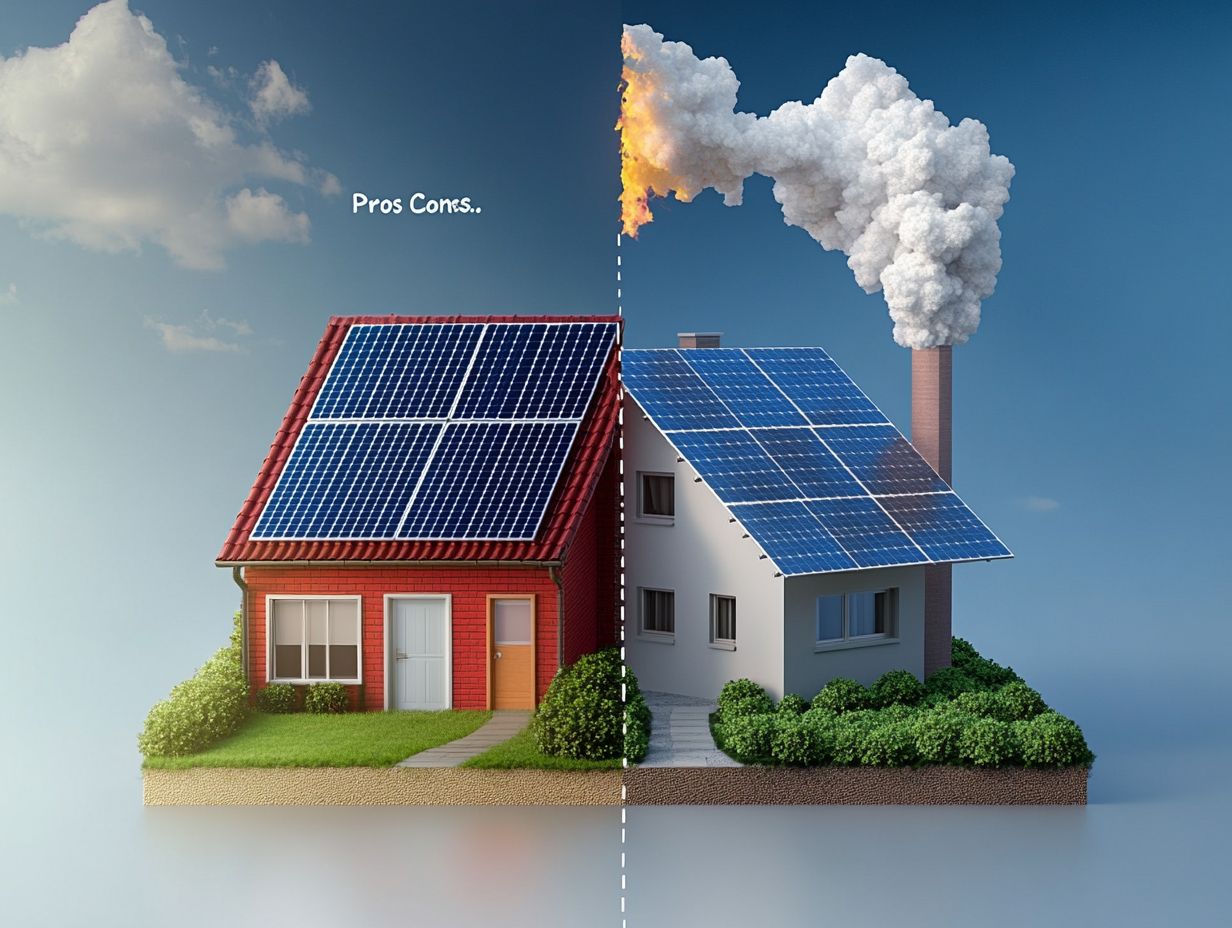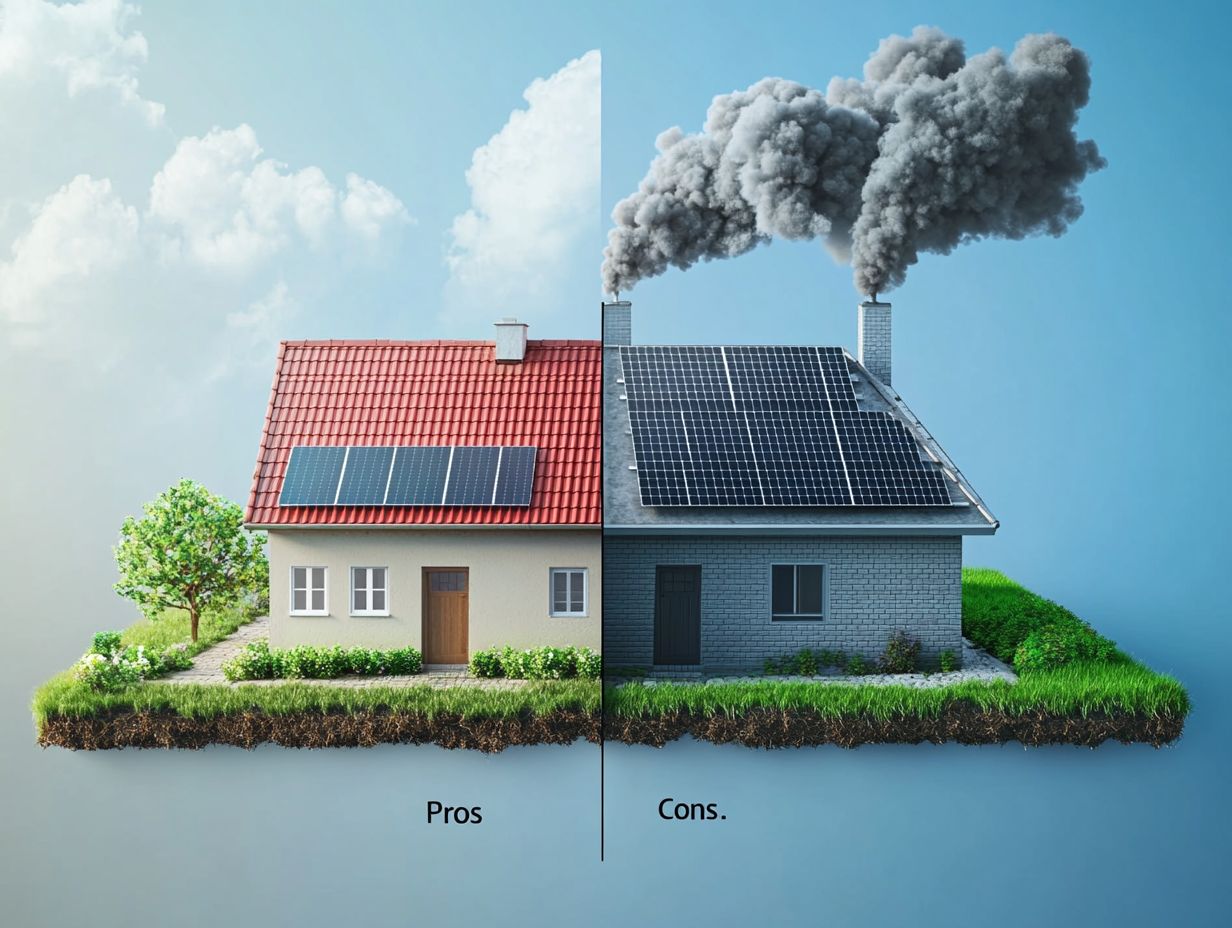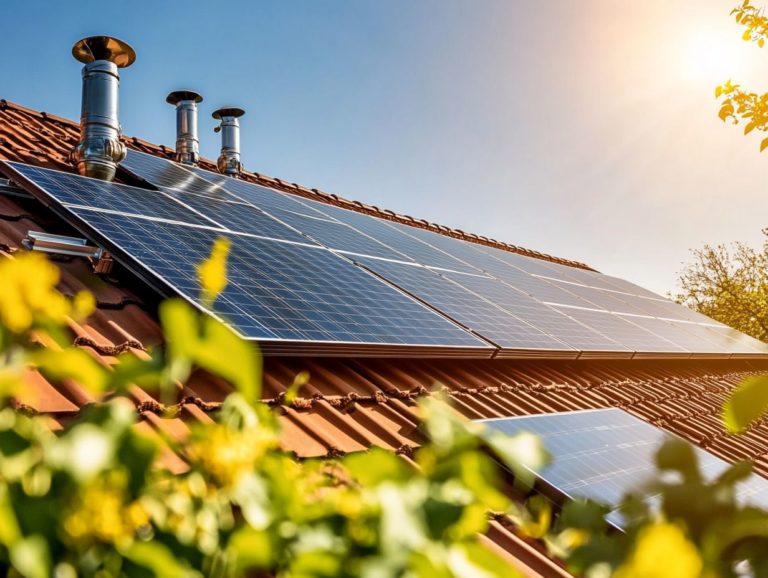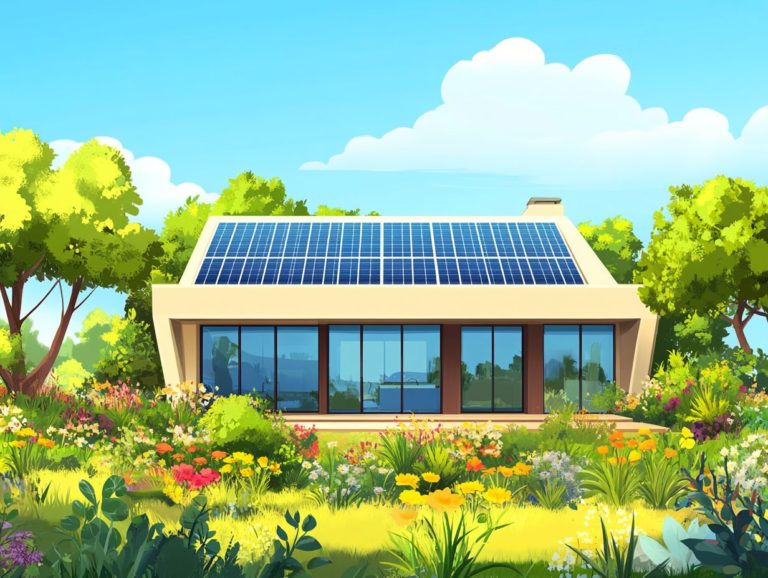“Solar Energy Pros and Cons: Is It Right for You?”
As the world shifts toward renewable energy sources, solar energy emerges as a premier choice for the environmentally conscious consumer.
This article delves into the essence of solar energy, illuminating how it operates and the many benefits it presents not just for the planet, but for your financial well-being as well.
It s important to consider the potential drawbacks and challenges. From grasping the nuances of various solar systems to assessing the costs and installation processes, this guide will empower you to determine whether solar energy is the ideal solution for your needs.
Contents
- Key Takeaways:
- What is Solar Energy?
- Benefits of Solar Energy
- Drawbacks of Solar Energy
- Assessing if Solar Energy is Right for You
- Types of Solar Energy Systems
- Costs of Solar Energy
- How to Get Started with Solar Energy
- Frequently Asked Questions
- What are the main advantages of using solar energy?
- What are the potential drawbacks of solar energy?
- Is solar energy suitable for all types of homes?
- How does solar energy affect the environment?
- What is the payback period for installing solar energy?
- How can I determine if solar energy is right for my home?
Key Takeaways:

Harnessing solar energy can benefit both the environment and your finances.
Consider factors like location, budget, and energy needs when deciding if solar energy is right for you.
There are various types of solar energy systems available, each with their own pros and cons to consider.
What is Solar Energy?
Solar energy involves harnessing sunlight to produce electricity or heat, positioning it as a crucial player in renewable energy solutions.
As the global community actively pursues sustainable alternatives to traditional fossil fuels, solar energy stands out as a premier choice, particularly in sun-rich regions like South Carolina, where its potential is fully realized.
By embracing technologies such as solar panels and PV (photovoltaic) systems, which are devices that convert sunlight into electricity, you can dramatically decrease your dependence on conventional energy sources. This paves the way for a greener and more sustainable lifestyle.
The National Renewable Energy Laboratories are continuously pushing the envelope in this field, increasing efficiency and making solar energy more accessible than ever.
Explanation of Solar Energy and How it Works
Solar energy is harnessed through photovoltaic (PV) systems, which convert sunlight directly into electricity using solar panels. This gives you the power to produce your own energy, whether at home or in your business.
These systems employ semiconductor materials that absorb photons from sunlight, energizing electrons and creating a flow of electricity. To maximize this energy production, integrating energy storage systems is essential; they store excess energy generated during sunny periods for use on cloudy days or at night, enhancing both reliability and efficiency.
This interaction affects the cost of solar energy, often making installations more cost-effective over time. Don’t miss out on tax incentives that can make solar energy even more affordable!
This means solar installations aren t just a sustainable choice; they re also an economically wise investment.
Benefits of Solar Energy
The benefits of solar energy are truly multifaceted, influencing both the environment and the economy in remarkable ways.
By harnessing solar power, you can significantly reduce your electric bills at home while simultaneously boosting the bottom line for your business. This makes it a savvy investment in renewable energy solutions that pays dividends for both your wallet and the planet.
Environmental and Financial Advantages
Solar energy offers essential environmental benefits by cutting down greenhouse gas emissions and reducing reliance on fossil fuels, all while providing substantial financial savings through lower energy costs.
When you transition to solar energy, you re not just contributing to a healthier planet; you re also setting yourself up for significant long-term savings on your utility bills.
This move towards renewable energy allows you to escape the unpredictable nature of traditional energy markets, paving the way for a more financially stable future.
Embracing green technology fosters energy independence, giving you greater control over your own energy production.
As solar adoption spreads, it promotes a more sustainable lifestyle and positively impacts local economies by creating jobs in installation and maintenance.
By choosing solar energy, you elevate your quality of life while playing a crucial role in ecological preservation.
Drawbacks of Solar Energy

Despite the many benefits of solar energy, you may encounter some drawbacks. These include the initial installation costs, which can be substantial, as well as widespread misconceptions that might discourage you from embracing this renewable energy source.
Potential Limitations and Challenges
The limitations of solar energy include several factors, such as the need for financing tools to manage upfront costs and possible problems during installation that can discourage adoption.
You may find yourself navigating a maze of financing options, from loans to incentives that ease initial expenses. It can feel overwhelming. The complexities of installation from site assessments to technical details can give pause to many considering the switch.
It s crucial to seek guidance from skilled installers. Their expertise is vital for optimizing your system’s performance, making the transition to renewable energy smoother and less stressful.
Assessing if Solar Energy is Right for You
Now is the time to evaluate your energy use, family budget, and the unique characteristics of your location to determine if solar energy is the ideal option for you.
Consider participating in solar net-metering programs provided by utilities, such as Duke Energy. This can significantly affect your decision.
Factors to Consider
When considering solar energy, it’s important to evaluate several key factors, including your current energy usage, available financing options, and how easy it is to install solar panels at your home.
Understanding your roof’s orientation and condition is vital. These elements can significantly impact your system’s efficiency and overall energy production.
Many regions offer local incentives that can reduce installation costs, making solar power more accessible. Explore exciting financing options that can help you save!
Solar net-metering is particularly advantageous, allowing homeowners like you to earn credits for any extra energy generated. This enhances the economic appeal of switching to renewable energy sources.
Types of Solar Energy Systems
You have an array of solar energy systems available, from PV Solar Systems to energy storage solutions and configurations for EV Chargers.
Each option is designed to cater to your unique energy needs while promoting sustainability.
Overview of Different Options

The primary options for solar energy systems include:
- PV Solar Systems for electricity generation.
- Energy storage solutions for backup power.
- Solar panels for capturing sunlight directly.
Each of these systems may qualify for enticing solar credits. They present unique benefits and potential drawbacks that homeowners should carefully consider.
For example, PV Solar Systems convert sunlight into electricity, potentially slashing your monthly energy bills. However, the initial installation costs can be daunting.
On the other hand, energy storage systems provide peace of mind during outages, ensuring you have power when it s needed most. Yet, they also contribute to your upfront investment. Crafting a solar setup that suits your needs involves evaluating your individual energy demands, available roof space, and long-term goals.
Explore various solar incentives at both the state and federal levels, which can include tax credits and rebates. Taking advantage of these incentives makes the financial case for harnessing solar energy even more compelling.
Costs of Solar Energy
Understanding the costs of solar energy requires a careful look at both initial installation expenses and long-term savings on your energy bills.
You ll find various financing options and utility rebates designed to alleviate the burden of that upfront investment.
Ready to harness the power of the sun? Let s get started!
Initial Investment and Long-Term Savings
The initial investment in solar energy systems may seem substantial. However, with careful planning and effective financing tools, you can unlock significant long-term savings and enhanced energy efficiency.
By carefully planning for these renewable assets, you can offset those upfront costs with the promise of decreased electric bills over time. This transition paves the way for a more sustainable energy source and grants you greater independence from the unpredictable nature of utility rates.
You can boost savings by incorporating energy-efficient habits into your daily routine. This allows you to maximize your return on investment.
As you embrace solar technology, you re likely to discover that the combination of reduced energy expenses and cutting-edge solutions leads to a healthier bottom line. This makes the switch to solar more viable than ever.
How to Get Started with Solar Energy
Embarking on your solar energy journey begins with thorough research into consultation services. Schedule a complimentary consultation with an experienced installer to discuss your options and explore different solar energy options that align perfectly with your needs.
Steps to Take for Installation and Maintenance
Installing and maintaining solar energy systems involves a series of thoughtful steps:
- Start with analyzing your energy needs.
- Select an experienced installer.
- Commit to regular maintenance to maximize performance.
These foundational phases are essential for a successful solar installation. They ensure that your chosen system aligns with your energy requirements and adheres to local regulations.
Once the installation is complete, setting a schedule for regular inspections becomes crucial. This proactive approach helps identify any potential issues before they escalate.
Using devices that help track how much energy your solar panels produce allows you to monitor energy production and consumption. This offers invaluable insights into your system s efficiency.
Over time, routine cleaning of the solar panels, checking for obstructions like dirt or debris, and evaluating the inverter’s functionality will significantly enhance your solar system s effectiveness.
Frequently Asked Questions

What are the main advantages of using solar energy?
Solar energy is a renewable and clean source that can help reduce your carbon footprint and save you money on electricity bills. It requires minimal maintenance and can provide energy independence.
What are the potential drawbacks of solar energy?
One of the main cons of solar energy is the initial installation cost, which can be quite high. It also relies on sunlight, so it may not be a reliable energy source in areas with limited sunlight.
Is solar energy suitable for all types of homes?
Solar energy can be installed on most homes, but it may not be feasible for certain types of roofs or homes in shaded areas. A professional assessment can determine if solar energy is a viable option for your home.
How does solar energy affect the environment?
Solar energy is a clean and renewable source. It does not emit harmful pollutants into the air and can help reduce reliance on nonrenewable energy sources, positively impacting the environment.
What is the payback period for installing solar energy?
The payback period varies depending on factors such as location, energy usage, and installation cost. On average, it can take 5-10 years to recoup the initial investment, after which you can enjoy significant savings on your electricity bills.
How can I determine if solar energy is right for my home?
Consider factors such as location, energy usage, and installation costs when determining if solar energy is suitable for you. Consulting with a professional can help you make an informed decision.
Ready to take the next step? Contact a local solar expert today!






